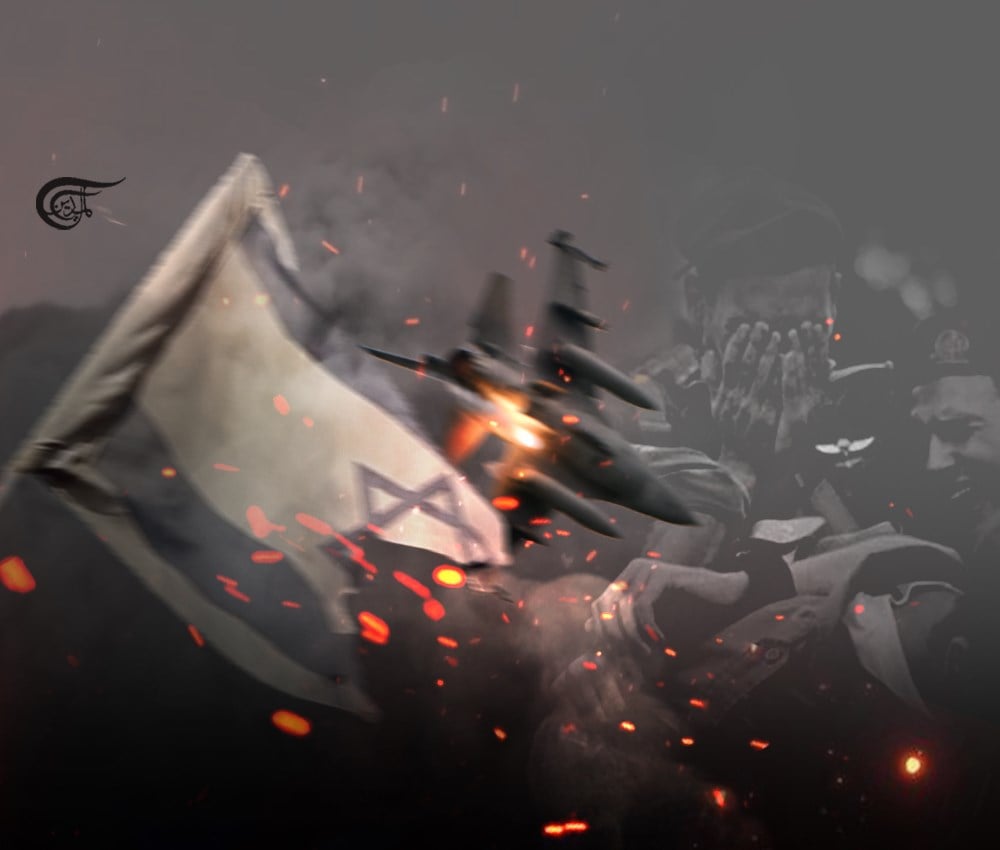"Israel’s" declining strategic position
On all fronts, internally, regionally, and internationally, “Israel” suffered strategic deterioration.
-

"Israel’s" declining strategic position
Three pillars of prime importance were fundamental for the success of the Zionist project in Palestine that led to the establishment of the “state of Israel”. These are : the relationship with the imperial powers in the West, the strength of the Zionist base in Palestine and its commitment and dedication, and the weakness and backwardness of the surrounding Arab/Muslim entities.
Well, “Israel” is witnessing a regress in these three fields.
Relationship with the West
The relationship with the USA is not like before. It’s true that “Israel” still enjoys the support of the establishment and the deep state in America. However, there are noticeable changes in the way “Israel” is looked at and dealt with, especially from significant circles in the Democratic party. That started from Barack Obama’s days when the rift between the American President and Israeli PM became very public in 2015. It wasn’t particularly about Benjamin Netanyahu, as some analysts put it, rather it was about the Israeli state’s policies and strategies in the region. Obama wanted to reach out to the Arab / Muslim world, and one of his first initiatives as a President, in 2009, was to address the Arab nations in a speech at Cairo University and to address the Iranian nation via a video message. He talked about tolerance and the need to correct the past’s mistakes and to have a new course for future American – Arab/Muslim relations. With that background, Obama felt that "Israel’s" expansionism, confiscation of Arab land, and refusal to allow the Palestinian people to have their own state, were negatively impacting America’s interests in the Middle East in the long run. The young generation of politicians in the Democratic part of the US Congress have been very critical of “Israel”, and have even pressed for a more balanced US policy in the Middle East.
Apart from politicians and government, the public atmosphere in the US is also rapidly changing. More civil rights groups, liberals, intellectuals, and celebrities are openly expressing views calling for justice for the Palestinian people and an end to Israeli occupation. A Gallup poll published in March 2020 illustrated a very worrying development for “Israel” regarding its influence over the American public. While it was almost a political taboo to criticize “Israel” in the past, the poll indicated that two-thirds of Americans, including 81% of Democrats say that it’s “acceptable” or even “the duty” of members of US Congress to question the Israeli-American relationship. Even Hollywood! The Israeli lobby in America can no longer take Hollywood for granted as part of its campaign. Several movie stars have taken pro-Palestinian positions and denounced "Israel’s" aggressions and atrocities in the past decade. Richard Gere and Michael Moore, just to mention a few. And we are not seeing many Hollywood celebrities nowadays actively supporting “Israel”, like how it was five or four decades ago.
In Europe, the deterioration of Israel’s position is even more apparent. The European Union has been supportive of the creation of a Palestinian independent state for almost three decades now and systematically refused all Israeli one-sided measures in Palestine, including the settlement activities and annexation of the occupied Eastern part of al-Quds. The Israeli representatives in many European countries have been publicly humiliated in academic meetings, political forums, the media, and even the EU Parliament. “Israel” has totally lost its influence over the Western audience in Europe. With every Israeli aggression on the Palestinian territories, we are witnessing massive expressions of support for Palestine and condemnation of Israeli policies. Tens of thousands of people took to the streets in mass demomnstrations in several European cities, with Palestinian flags and slogans, calling for justice and an end to the aparthied-like Israeli system. Perhaps in Germany, due to its World War II Nazi history, there remains some caution in directing blame and pin-pointing criticism to “Israel”.
Internal Weakness; Non-Committed New Generation
Although Western, American, and European, support for “Israel” has always been vital to its continuity and well-being, it’s the “danger from within” that most seriously threatens “Israel”. The new generation of Israelis does not have the kind of commitment and enthusiasm toward the Zionist cause as the past, the first generation of immigrant Zionists who founded “Israel”. It happened repeatedly over the past two decades that young Israeli soldiers show signs of low spirit and cowardness. Some of them even surrendered easily in battle ground. This is in contrast with the new and amazing Palestinian generation that is emerging. Young Palestinians, politically aware and nationally inspired, are ready to fight and sacrifice for their country, not intimidated by the might of the Israeli occupation army, nor depressed by the weakness of the current Palestinian Authority.
In recent years, the Israeli occupation army has found itself in a state of “mutual deterrence” with the Palestinian resistance movements. The Israeli army cannot maintain long–term operations against Gaza anymore. It is also noticed that the Israeli forces keenly avoid the ground and direct combat fighting with the Palestinian guerrilla fighters inside the Gaza Strip. The power of the Israeli army is now limited to launching periodic campaigns of destruction and assassinations. This is a very important military development that has strategic implications.
One more note concerning the Israeli military industry. “Israel” was for long very proud of its weapons manufacturing and managed to create a high reputation for its technology and efficiency. That generated considerable business and profits due to arms sales in many places in the world. However, it’s now changing. Thanks to the resistance movements, the reputation of the Israeli weapons industry was torn apart, especially after the world saw the failure of its “Iron Dome” system to down the Palestinian rockets and before that, in 2006, how the Lebanese resistance tarnished the reputation of Israel’s Merkava tank and turned it into a joke!
Regionally: Becoming a Paper Tiger
Regionally, “Israel” finds itself in a state of a delicate balance of power with the resistance movement in Lebanon, Hezbollah. After its miserable defeat in south Lebanon in the year 2000, and the failed 33-days assault on Hezbollah in 2006, “Israel” realized its limits and was forced to accept the new rules of engagement with Lebanon; any Israeli aggression will be countered by a relevant painful and costly response. Since 2006, no all-out confrontation with Hezbollah took place because of this balance of power. Gone are the days when the Israeli forces were able to wander in Lebanese territory, carry out military operations, and then withdraw safely. It is a remarkable achievement for Hezbollah which was the first to humiliate the Israeli forces in 2000 and until now bravely defending Lebanon’s borders and resources.
The biggest Israeli failure is obviously vis-à-vis Iran. For almost fifteen years, “Israel’s” primary attention and its main focus was on Iran. Threatening, warning, and loudly speaking about the importance of curbing Iran’s nuclear program. “Israel” was hoping, and pushing very hard for that end, that America will undertake military action against Iran. However, the US made it clear to “Israel” that direct military assault on Iran or open war with it was not on the agenda. Instead, America resorted to a combination of economic sanctions and political negotiations with Iran to deal with its nuclear file. “Israel”, under right-wing and hard-line governments, was left with the harsh reality that America was not willing, or more accurately not capable of launching a war on powerful Iran.
But “Israel”, despite all the fuss it created and the hype about Iran’s “nuclear threat”, wasn’t able to do anything, militarily speaking, against Iran. It didn’t dare to attack or raid Iran’s nuclear facilities. The real status of “Israel” appeared like the sun in the sky; it’s nothing more than a paper tiger. The maximum “Israel” was able to do was to organize some covert operations targeting certain Iranian scientists, and launching air raids on Syria, Iran’s ally, benefiting from Syria’s army engagement in the battle against internal and external terrorist groups. That’s all that “Israel” was able to do in the face of what it calls the “existential threat” posed by Iran.
“Israel”, however, scored some points in the past few years. Namely, it was the so-called “Abraham Accords” that it signed to normalize relations with certain Arab countries. A great deal of jubilation was there in “Israel” and Netanyahu, the PM who signed the agreements, tried to portray them as if it were a new era or a new future for “Israel” in the Middle East that accepts it as a normal part of it. But that can hardly be the case. Truth is, these Trump-solicited accords were no more than agreements with military rulers, dictatorships, and tribal regimes that do not represent the peoples of the middle east.
On all fronts, internally, regionally, and internationally, “Israel” suffered strategic deterioration. It's no longer the superior state that dominates the Middle East militarily, technologically, and politically. That's over. And the future holds more.

 Hussam AbdelKareem
Hussam AbdelKareem
 9 Min Read
9 Min Read











